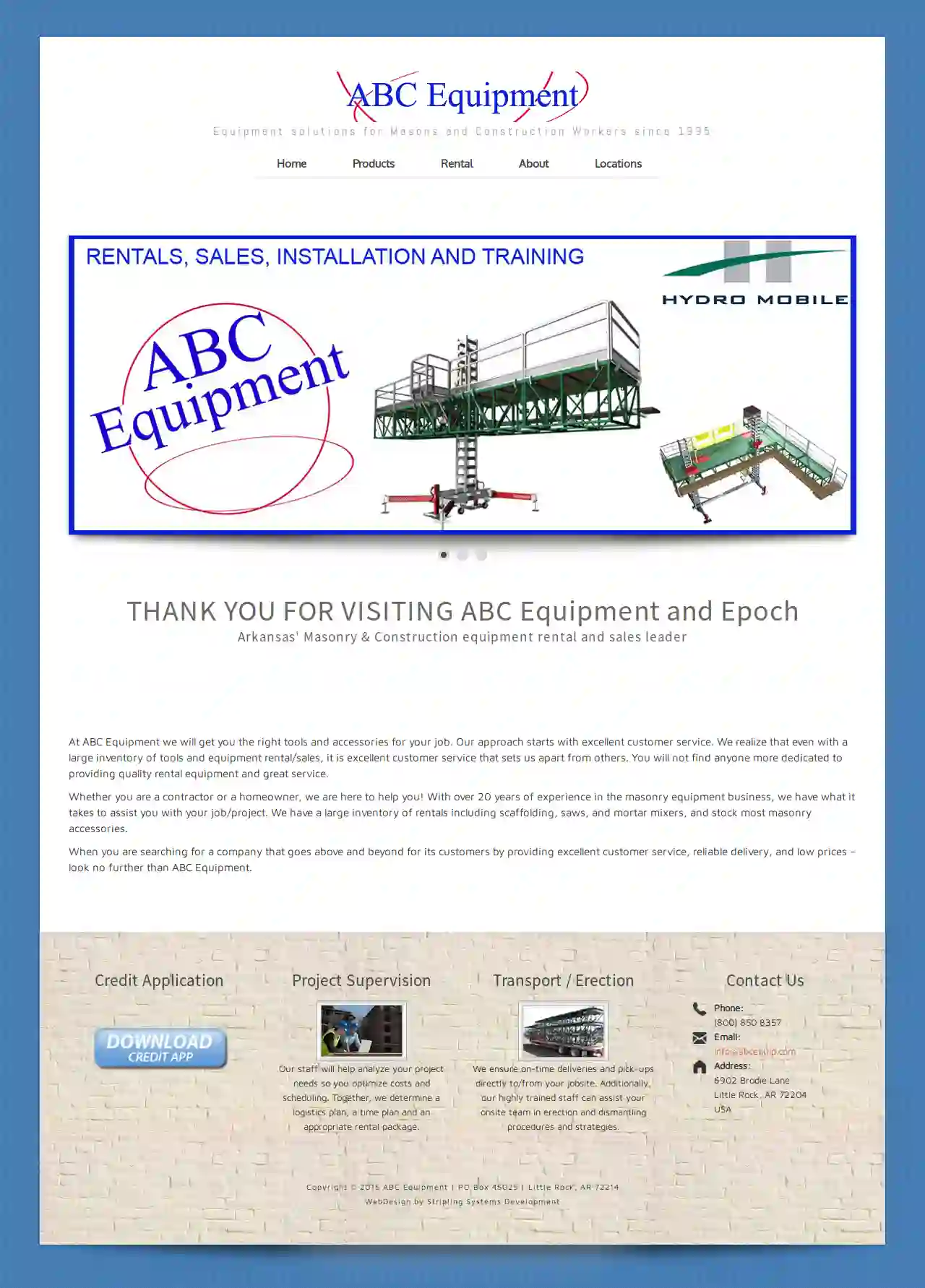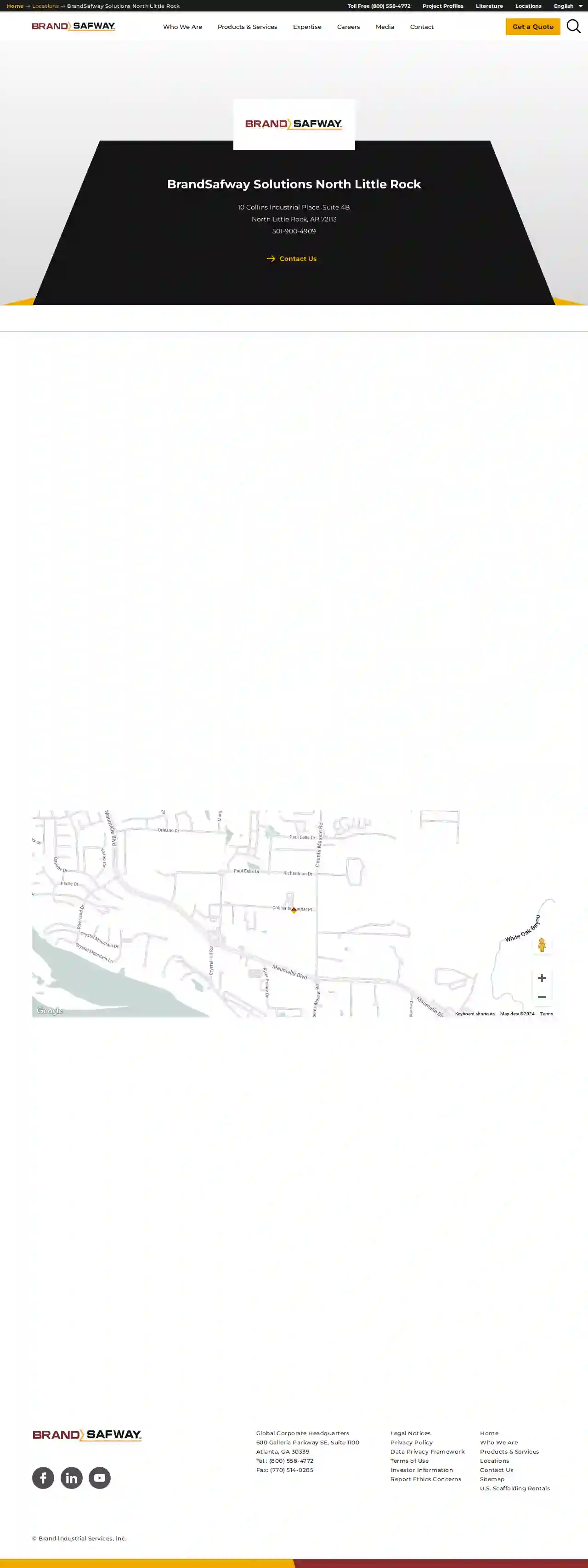Scaffolding Companies Malvern
Find top Scaffolding Builders in Malvern
Get up to 3 Scaffolding Solutions quotes for your project today! Compare profiles, reviews, accreditations, portfolio, etc... and choose the best service.

ABC Equipment
4.19 reviews6902 Brodie Lane, Little Rock, 72204, USABC Equipment: Your Partner in Masonry & Construction Since 1995, ABC Equipment has been a trusted provider of equipment solutions for Masons and Construction Workers in Arkansas. We understand the importance of having the right tools for the job, and we're committed to providing our customers with the highest quality equipment and exceptional customer service. Our team is dedicated to helping you succeed. We offer a wide range of rental equipment, including scaffolding, saws, mortar mixers, and a variety of masonry accessories. We also provide project supervision, transportation, and erection services to ensure your project runs smoothly. Whether you're a seasoned contractor or a homeowner tackling a DIY project, ABC Equipment is here to support you. We're proud to offer competitive prices, reliable delivery, and a commitment to exceeding your expectations. We're more than just an equipment rental company; we're your partners in success. Contact us today to learn more about how we can help you achieve your project goals.
- Services
- Why Us?
- Gallery
Get Quote
BrandSafway Solutions North Little Rock
North Little Rock, AR, 1234 Industrial Blvd, 72118, USBrandSafway is a leading provider of access solutions, including scaffolding, aerial work platforms, and forming and shoring. With a strong commitment to safety, quality, and customer satisfaction, BrandSafway offers a wide range of services tailored to meet the unique needs of clients across various industries. Their team of experienced professionals is dedicated to delivering innovative solutions that enhance efficiency and productivity, ensuring successful project outcomes.
- Services
- Why Us?
- Accreditations
- Our Team
- Testimonials
Get Quote- Un
Universal Scaffolding & Equipment
4.33 reviewsLittle Rock, US- Services
- Why Us?
Get Quote - Un
Universal Dock & Door
Little Rock, US- Services
- Why Us?
Get Quote
Over 2,353+ Scaffolding Contractors on our directory
Our scaffolding contractors operate in Malvern and beyond!
ScaffoldingHQ has curated and vetted Top Scaffolding Companies arround Malvern. Find a reliable contractor today.
Frequently Asked Questions About Scaffolding Companies
- Project Height and Access: The height of the structure and the accessibility of the working area are primary considerations.
- Load Capacity: The weight of workers, materials, and equipment that the scaffolding needs to support.
- Project Complexity and Shape: The shape and complexity of the structure may necessitate specialized scaffolding configurations.
- Ground Conditions: The type of ground (soft, uneven, sloping) will influence the scaffolding foundation and support requirements.
- Duration of Use: The length of time the scaffolding will be needed can impact the choice of system.
- Budget: Different scaffolding types have varying costs.
- Work at Height Regulations 2005: Covers all work at height and outlines the need for risk assessments, competent erectors, and safe equipment.
- Construction (Design and Management) Regulations 2015 (CDM): Applies to construction projects and requires planning for scaffolding safety throughout the project lifecycle.
- British Standard BS EN 12811: Sets standards for the design, manufacture, and testing of scaffolding components.
- NASC (National Access & Scaffolding Confederation) Guidance: Provides industry best practices and safety recommendations for scaffolding.
- Online Directories: Use specialized directories like ScaffoldingHQ to search for scaffolding companies in your area.
- Search Engines: Use Google or other search engines to search for 'scaffolding companies near me' or 'scaffolding rental [your location]'.
- Local Construction Associations: Contact local construction associations for recommendations.
- Word-of-Mouth Referrals: Ask friends, family, or colleagues for recommendations based on their past experiences.
- Steel: The most common material due to its strength, durability, and resistance to corrosion.
- Aluminum: Lighter than steel, often used for smaller projects or where weight is a concern.
- Timber: Used for decking platforms and some traditional scaffolding structures. It's less common now due to its susceptibility to rot and damage.
- Fiberglass: Used in specialized applications where electrical conductivity is a concern.
How do I choose the right type of scaffolding for my project?
What are the safety regulations for scaffolding in the USA?
How can I find scaffolding companies near me?
What are some common materials used in scaffolding?
How do I choose the right type of scaffolding for my project?
- Project Height and Access: The height of the structure and the accessibility of the working area are primary considerations.
- Load Capacity: The weight of workers, materials, and equipment that the scaffolding needs to support.
- Project Complexity and Shape: The shape and complexity of the structure may necessitate specialized scaffolding configurations.
- Ground Conditions: The type of ground (soft, uneven, sloping) will influence the scaffolding foundation and support requirements.
- Duration of Use: The length of time the scaffolding will be needed can impact the choice of system.
- Budget: Different scaffolding types have varying costs.
What are the safety regulations for scaffolding in the USA?
- Work at Height Regulations 2005: Covers all work at height and outlines the need for risk assessments, competent erectors, and safe equipment.
- Construction (Design and Management) Regulations 2015 (CDM): Applies to construction projects and requires planning for scaffolding safety throughout the project lifecycle.
- British Standard BS EN 12811: Sets standards for the design, manufacture, and testing of scaffolding components.
- NASC (National Access & Scaffolding Confederation) Guidance: Provides industry best practices and safety recommendations for scaffolding.
How can I find scaffolding companies near me?
- Online Directories: Use specialized directories like ScaffoldingHQ to search for scaffolding companies in your area.
- Search Engines: Use Google or other search engines to search for 'scaffolding companies near me' or 'scaffolding rental [your location]'.
- Local Construction Associations: Contact local construction associations for recommendations.
- Word-of-Mouth Referrals: Ask friends, family, or colleagues for recommendations based on their past experiences.
What are some common materials used in scaffolding?
- Steel: The most common material due to its strength, durability, and resistance to corrosion.
- Aluminum: Lighter than steel, often used for smaller projects or where weight is a concern.
- Timber: Used for decking platforms and some traditional scaffolding structures. It's less common now due to its susceptibility to rot and damage.
- Fiberglass: Used in specialized applications where electrical conductivity is a concern.